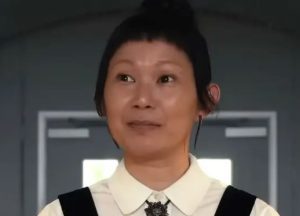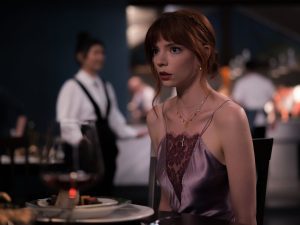What do the characters in The Menu represent in our society?
Ferries taking our main characters to distant, dreadful islands has never ended up well. Shutter Island, The Lighthouse, and now The Menu; this curse is never-ending. The magnitude of damage this can potentially inflict is unmeasurable on many occasions. In the scheme of cinema, it presents an opportunity for the makers to explore high-end concepts and grace their executions with a strongly personal artistic flair. Mark Mylod certainly makes the most of this opportunity with The Menu starring Anya-Taylor Joy and Ralph Fiennes. His inviting project is titillating, contemptuous, and proves to be first-rate entertainment for all kinds of viewers.
While the plot is not straightforward, its thematic web is even more complex and rich. Mylod’s commentary finds its basis in the exploitative service industry and goes on to reach the depths of human emotions and our species’ increasingly diminishing ability to preserve our morality and respect that of others. Through Chef Slowik, the film also mounts an attempt to critically scrutinize the excess adulation and praise heaped on renowned artists just for the sake of it without celebrating their craft.
These distinguished individuals have championed their professions, yet the work they produce is taken for granted. It is easily missed over the efforts to associate oneself with them in order to improve their self-worth and gain validation in the eyes of others through platforms like social media. An ongoing indictment of the rich and their practices give rise to this absurdist masterpiece. It exposes those parts in you that willingly participate in this debauchery and celebrate it.
This think-piece will elaborate upon what each of the diners at Hawthorn represents in Mark Mylod’s larger allegory of our decaying society. It is not an ending explainer of the film’s plot, themes, and ending, which you can find here. This is much more of a deep-dive essay piece and would love to hear your thoughts in the comments below!

Elsa – the elusive servant seeking perfection
Hong Chau definitely hit all the right spots with Elsa. Her character encompassed the spirit of what Mylod was trying to get at in The Menu. Elsa’s role in the setting was extremely important given her job profile and apparent closeness with the chef. Chau’s deadpan delivery and the dissociated, indifferent tenor in her dialogue made sure Elsa was someone memorable. Elsa is representative of the hustle culture that has made the term “burned out” irrelevant. She even goes on to say that at the start of the film.
The elusive and ambitious search for perfection and wanting more drives her. Working beyond one’s capabilities has been normalized and moulded in a fashionable way for those entering this phase of life. One cannot slack and be left behind by the next person. She represents the urgency to become a part of the system and be so functionally significant that it cannot work without them. Elsa can be seen as Slowik’s right hand – someone he trusts to execute no matter what the task. But her very loyalty and devotion to Slowik caused her downfall in the end.
Slowik asked Margot to fetch the barrel and did not tell Elsa where it was kept. She noticed this fact and followed Margot to Slowik’s house. So afraid and paranoid that she was being replaced, Elsa was ready to lay down Margot’s life to keep her association with Slowik alive.

Tyler Ledford – the entitled enthusiast seeking approval
Now, this character represents something very personal in me. And perhaps every other human being in the world who obsesses over a renowned genius. In my case, it is Leo Messi, the newly crowned world champion from Argentina. Seeing Tyler in The Menu was a constant reminder of my own probable reaction if I met the great man. Those characteristics are so universal that everyone could a part of themselves in him.
Nicholas Holt was indeed cynically charming as Ledford. He gave the impression of the entitled enthusiast who does not know where the line ends. For a very specific reason, he did not seem to think that the rules applied to him. He was the exception for creating the perception that he knew about Slowik’s creations and was passionate to a fault like the chef was. But when his turn came, he faltered. Tyler wanted to make his mark with half-cooked ideas (no pun intended) hoping the world will come to his feet and resenting that same audience he so pleases to please for not doing so.

Lillian & Ted – faux intellectuals destroying art and the artist
Mylod’s observations and typification through Lillian can be understood as a universal idea of self-proclaimed experts who mindlessly assail works of art. Perhaps film critics too fall into that category, like all other categories of “critics” tasked with expressing what the consumer thinks. Lillian was responsible for closing many restaurants that had “lost their appeal” in her viewing. Slowik punished the institution she represented. Her criticism lacked credibility and it was hilarious to see her mangle her obstinate thesaurus of descriptive expressions to critique Slowik’s food.
His satire and aspirations were lost on Lillian. Ted was merely a conduit to her, moving however she wanted him to. Both their inclinations are not in the best interest of the artist but themselves – their brand, image, and status. Although it is a bit farfetched, Lillian can be seen as an envious underachiever acting like an overachiever.
The Finance Bros – carrying the curse of the Wall Street
For many years, cinema has solidified the greasiness of money and those who make them. The world of finance is a tough one to survive in. Its cut-throat worldview has a capitalistic philosophy that drives action. Slowik said a very interesting line that defines people like them. “You will eat less than you desire and more than you deserve.” The Finance bros tend to do exactly the opposite and by punishing them, Slowik took out his anger on their boss, Verrick, who gifted him the restaurant. The reason why Slowik hates Verrick is that Hawthorn drained all the love, he had for making food.
The existence and branding of the rich-sounding dishes proportionated his gift. Slowik felt hollow inside and lost his appeal for preparing food. The trio also represent the” bro culture” – office camaraderie, bros before hos, that kind of stuff. Guys like Cameron from White Lotus 2 – all show and no meat. They have flawed perceptions about what truly matters in the world. A sense of false belief that work and money are all that they want. Most of them cannot ever talk about their feelings. They do not want to confront them.

The Movie Star and Richard – pretentiousness, the apathy of money, and forging a class divide
This one is fairly obvious. Richard’s hypocrisy was exposed when Slowik asked him to name one dish that he had previously eaten at Hawthorn. The old man regarded himself as a connoisseur of Slowik’s food and championed his rags-to-riches story. He had no intention of enjoying or appreciating the food but still wanted to visit because he could and doing so would keep expectations of others from him sky high. The Movie Star came across as a softer target due to his genuineness in the end but he falls in the same echelon of society.
Margot – the voice of sanity in a maddening world
Margot was never supposed to be on the ship. Someone else was destined to come with Tyler and Slowik knew this instantly. His rage was carefully directed towards everything he hated. Tyler’s partner for the evening also “deserved” what happens to the other diners but Margot did not. Slowik had no idea who she was – a giver or a taker. For him, she was morally superior by the virtue of not belonging to that pretentiousness. She did not partake in eating the garbage food and Slowik saw that. He gave her an opportunity to escape but Margot failed him in a sense.
It was not until she demanded to have a cheeseburger that Slowik made up his mind to let her go. Margot represents the everyday man for whom life is fairly simple. The notion of their existence is not defined by money, status, or class. This does not mean they lack ambition or ability – just a mundane love for trying their best and making what they can of life.
But those are just out thoughts on the matter. Do you agree? Do you see extra meaning in the characters within The Menu We love to hear from you so do let us know your thoughts in the comments below!

